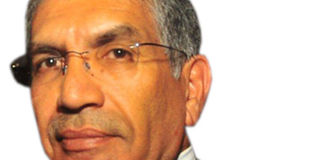Mukwano’s diversity into agriculture

Tony Gadhoke, the Mukwano Group CEO.
What you need to know:
Mukwano Industries has become a household across Uganda. At least every household uses Mukwano products on a regular basis. Tony Gadhoke, the Mukwano Group CEO , told Daily Monitor about the company’s growth projections and its interest in agriculture.
Mukwano Industries seems to have shown interest in the agriculture sector of recent. Could you tell as what is behind this motivation?
Our interest in agriculture is driven by three factors, including the need to grow our own raw materials for our vegetable oil and soap products, supporting the country’s key growth requirements and assisting government to reduce poverty in the country.
We found we could not sustain importation of raw materials from the Far East. So we had to develop as a foreign currency hedge by producing our own raw materials.
What agricultural activities are you involved in?
We are involved in the production of sunflower and soyabean crops as oilseeds for our vegetable oils business and maize, to give the farmers food security
What is your agribusiness model?
We adopted the contract farming model, where we work with more than 72,000 outgrowers to provide extension services
With more than 72,000 out-growers in northern Uganda, how do you control the quality grain?
With such a large population of outgrowers spread out in more than 12 districts in northern Uganda (and we want to go pan-Uganda), our reach to them and the assurance of having a productive arrangement that is mutually beneficial, required us to develop a robust extension system. We ensure we have regular face-to face interactions with farmers to do agronomic activities on a timely basis, rightly manage the crop until harvest as well as harvesting threshing and drying the grain.
Peasant farmers are usually cheated by middlemen. What measures has Mukwano put in place to ensure farmers still benefit from their sweat?
Our extension services are structured into a very simple pyramid, with 25 to 30 farmers grouped into a producer organisation and about 3,000 of these are linked to a commercially minded lead farmer. So with about 250 lead farmers reporting to a group of extension officers, we ensure we have daily communication within this network where we advise about weather, prices, need for logistics.
So these activities help us to keep the risk of middlemen to a minimum, but there is still a huge challenge
Can you please explain how your contract farming operates?
We hold simple contracts with farmers each season, whereby we agree a minimum guaranteed price with the farmer.
Apart from contracting farmers, what benefit are Mukwano’s agribusiness operations to northern Uganda?
The Mukwano oilseeds programme generates more than Shs60b annually. Therefore it not only enables farmers to improve livelihoods but also generates revenues for Local Governments, which helps to promote service delivery in areas that we operate from.
How much have you so far invested in your farming projects in northern Uganda?
We have injected more than Shs75b ($25m) in developing our operational infrastructure including real estate, plant and equipment and logistics.
We have also earmarked an annual investment of between Shs9b ($3m) and Shs15b ($5m) in expansion and diversification programmes.
As one of the biggest local companies, what do you bring on Uganda’s table in terms of employment, taxes, corporate social responsibility?
We directly employ more than 2,000 people but the compounding factor in terms of Ugandans whose welfare is dependent on our business is significant. As a group we are one of the largest tax payers in Uganda with deeply rooted CSR activities to give back to society.
Workman compensation has always been a thorny issue in the manufacturing sector. How do you manage this?
First of all, we have policies and operating procedures that ensure we recruit the right people and continually train them, especially in areas of safety, health, security as well as ensuring that protective equipment is always worn.
We provide medical services to our staff through a clinic at our main factory and arrangements with local hospitals.
As a statutory requirement, we insure all direct and contract staff under workmen compensation insurance. Obviously, accidents happen but we ensure, that these are fully investigated and acted upon.
What did Mukwano do right to change the tide of dominance of foreign consumer goods on the Ugandan market?
We give Ugandans quality and affordable products that are available at practically every sales outlet in the country.
Tell us about the benefits that come with working at Mukwano Industries.
A business is all about people, especially its employees. We ensure our staff earn competitive salaries and have a sound welfare programme in place to look after them in terms of family health, collective bargaining and severance pay, among others.
How can Uganda strengthen its industrial capacity to compete favourably in the EAC region?
As President Museveni keeps saying, we must focus on agriculture and value addition. Uganda has the ability to be the focal point for the region’s and Africa’s food security. And this is not only limited to human but to livestock as well.
Where do you envision Mukwano in 15 years?
An industrial and agriculture powerhouse operating and/or present in most sub-Sahara economies.
What new areas of production is Mukwano looking to in the coming years?
We are continuously looking at improving not only efficiency but also quality of what we manufacture.
Therefore, there is a continuous review of technology, raw materials and packaging. In terms of new products, we shall further enhance our oilseeds operations to include the manufacture of animal feeds, thereby giving the Ugandan livestock industry quality and nutritious fees to improve productivity whilst doing value addition locally and further supporting Uganda’s economy.




